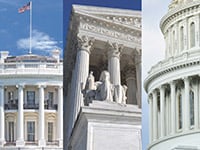|
In this issue, we discuss developments in labor law under the Trump administration, including a shift in the DOL wage and hour policy. We also examine advancements in D.C., New York, and California concerning leave, work schedules, and hiring practices. Finally, we focus on trade secrets, looking at the Defend Trade Secrets Act and the use of metadata and electronically stored information. | |
| ARTICLES | |
 |
Labor and Employment under Trump This week, President Trump announced his plans to nominate William Emanuel to the National Labor Relations Board. Emanuel is Trump’s second nominee this month, joining Marvin Kaplan, currently with the Occupational Safety and Health Review Commission. If confirmed, Kaplan and Emanuel would tilt the five-member board to being Republican-controlled. We had previously analyzed the current state of the NLRB and what employers should know while the agency is in flux – key points that still apply with these nominations. Earlier this month, the U.S. Department of Labor withdrew two Wage and Hour Division administrative interpretations on independent contractors and joint employment, thereby signaling a significant shift in wage and hour policy. The withdrawn Obama-era guidance had increased scrutiny of employers to correctly classify workers as employees and adopted expansive standards for determining joint employment. While the withdrawal of the guidance has little bearing on existing law, it is a strong indication that the administration will attempt to reverse Obama-era policy in favor of less aggressive regulation. After President Trump signed an Executive Order requiring that, for every new federal regulation implemented, two must be cut, many employers may have breathed a sigh of relief at the prospect of less pervasive regulatory burdens. In our recent Bloomberg Law article, we discuss why celebrations may be premature, and recent efforts in New York to continue the push for additional employee protections. Additional coverage from Capitol Hill and the White House can be found on our Presidential and Congressional Outlook site. |
 |
Advancements in Family Leave and Employee Work Schedules: D.C., New York, and California In April, the D.C. Universal Paid Leave Act became law, requiring all D.C. employers, regardless of size, to provide employees with paid leave, including up to eight weeks of family, parental, and/or medical leave each year. New York State will soon join the movement to provide more paid family leave to its private sector employees. As part of its 2016-2017 budget, the New York State Legislature passed laws mandating gradual increases in New York's minimum wage rate and, for the first time, requiring paid family leave. New York's Paid Family Leave program will go into effect on January 1, 2018. In New York City, Mayor de Blasio signed bills last month aimed at ensuring work-schedule consistency and predictability for workers in the retail and fast food industries. In Mendoza v. Nordstrom, Inc., the California Supreme Court clarified how courts and employers should interpret California's "day of rest" statutes, which generally provide that employees shall not work more than six out of seven days. The matter is currently on appeal to the Ninth Circuit, but the decision provides valuable guidance for California employers, including that employers should not schedule employees to work more than six days in any given workweek unless an employee worked less than thirty hours in that workweek or worked less than six hours per day, each day, during the workweek. |
 |
Employers Beware of Your Hiring Practices in D.C. and New York Pursuant to the Fair Credit in Employment Amendment Act of 2016, which became effective in April, most D.C. employers are now prohibited from requesting or utilizing a current or prospective employee's credit information. A violation of the Act will be considered an unlawful discriminatory practice and may subject offending employers to a fine imposed by the D.C. Commission on Human Rights or a private cause of action. What should D.C. employers know? Farther north, the New York City Council passed a bill prohibiting City agencies from inquiring into job applicants' salary history, which Mayor de Blasio signed into law in May. In complying with this new law, employers must be mindful of the distinction between prohibited inquiries and permissible avenues of salary discussion. Another law impacting NYC employers is the Freelance Isn't Free Act, which took effect on May 15, 2017. Now that the Act is in force, independent contractors in New York City have statutory guarantees to a written contract, and timely and full payment of wages. |
 |
A Focus on Trade Secrets In May, a Pennsylvania court entered judgment for plaintiff on the first Defend Trade Secrets Act claim to be litigated to a jury verdict. The dispute raised an interesting question: Now that both federal and state claims are available in most jurisdictions, can you and should you plead both? You might have heard about "mining for metadata." What does it mean? How is it done? Should you do it? When the origins of a critical document are at issue, you know to examine that document's metadata. "Mining for metadata" is something else. Read our previous blogs on the use of metadata and electronic storage devices. Also on our blog, we've previously explained the foolishness of trying to destroy or alter electronically stored information that qualifies as evidence in litigation. Why foolish? Read our blog post on Foolishness and the Well-Paved Road to Sanctions to find out. |
| VENABLE L&E NEWS, EVENTS, AND BEYOND | |
|
Douglas Mishkin, Nick Reiter, and Karel Mazanec co-presented "An Independent Contractor, an Employee, and Their Attorney Walk into a Bar: Why This Is No Joke for a Nonprofit." Copies of the webinar and presentation materials are available. The Daily Record quotes Ron Taylor on NLRB ruling that college RAs can unionize Newsday quotes Nick Reiter on employment non-compete agreements in New York | |